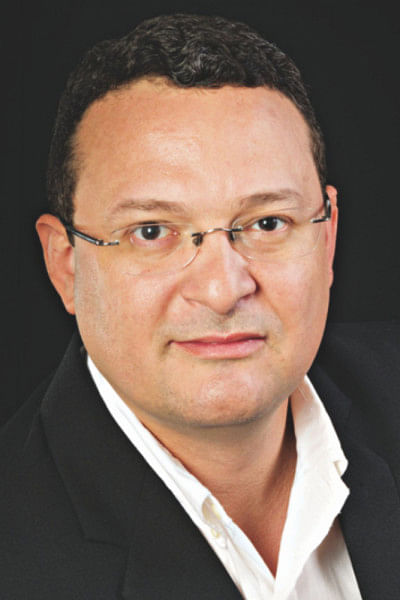Our economic and political choices now will determine our children's future

Unicef and other organisations have been advocating for a long time that this allocation should be at least 20 percent of the total. What are your thoughts on this year's proposed allocation?
I think it's a milestone moment for Bangladesh. Bangladesh is on the path of transition to a developing country. Now, alongside rapid economic development, inequality can also grow. But there are also more resources available, so the economic and political choices that are made today will determine the future.
The commitment of increasing the allocation to 20 percent will be a massive shift. In practical terms, going from 14 percent to 20 percent represents a growth of more than 40 percent of the current allocation. Where will this money go? I believe Bangladesh has moved forward strongly in terms of education, yet part of this new allocation should go to expanding two years of pre-primary education and also towards children who are out of school. There's a strong commitment to provide skills to children who have left school, and I think that's a very important element for equity.
There's another area that Bangladesh has not prioritised as much as the rest, which is investing in children under the age of five. What would this mean? You have programmes for pregnant mothers for social protection to take care of children up to six months. Then there's a gap between six months and five years. Bangladesh is discussing the creation of a child benefit scheme that would provide vulnerable households with cash grants so that cognitive growth of children is protected and proper nutrition is ensured during this very crucial period of growth. Putting in place a programme that looks at 7.5 million children would require a big investment. And this commitment of 20 percent would create the fiscal space to achieve that goal.
There are major opportunities on the table in two areas: quality of education and in nutrition of young children.
How does the decrease in allocations for education, health and social safety affect the ambitions that we have or the interventions that we need?
The budget grew by 15 percent, so proportionately there has been a decrease. The Child Budget last year was 13.9 percent, now it's 14.13—a small growth. But it's also a hundred million taka more that is available. The other element is that it's not only how much you spend, but how you spend it. An incremental budget is very good when you have a cost-effective model and you are investing resources in the right things. It is therefore important to understand how the composition of the expenditure is being set up in the government and see that we have a more effective budget even with a lower proportional investment.
Has our spending been effective till now?
I think there are areas of opportunity for Bangladesh. When you look at the social protection scenario, or the social safety nets, you have currently over 140 interventions. But when you look at the distributions, you see there are many which are not heavy on the budget. That's an opportunity to start reducing that number and consolidating programmes.
Also, if we are able to track a single beneficiary number for a child that comes into a maternal child health programme, and that same tracking system can track the child along his life until he goes into education, goes to the labour market and becomes a taxpayer, then we can see significant benefits. So a single identification number will be a very important driver for monitoring and making programmes leaner. One of the challenges is exactly that—reducing the amount of programmes and consolidating resources into a more systemic approach of interventions.
Another important driver will be the expansion of birth registration at a timely moment. In Bangladesh, a substantial proportion of children obtain birth certification at the moment of going to school, but already it's too late by the time these children appear in the statistics. There's a global commitment to go for birth registration under 45 days. I think this is also a target that should be accomplished with the increased allocation that we will see. Birth registration will give children protection and the government information on how to best provide services for the population.
Could you specify what sort of issues we have failed to address and we should focus on now?
I would not call these failures as development is a continuous process of learning and improving ways to enhance the wellbeing of a population. I think that expanding two years of pre-primary education in the entire country is something that should be enabled now with an incremental budget—to make sure that all children who are four or five years old are able to have a school-based education and get them ready for primary education. If we can do that, it is going to have immense returns on investments.
Another issue, the impact of which we still don't know, is the fight in ending child marriages. This one is very complicated, because it is driven by social norms, but also by the perceived opportunity cost of girls and boys. Keeping girls in schools longer will have a decisive impact on child marriage. Not only for this generation but also for future ones as girls and women who are educated have children who are more likely to finish school. So there's going to be an important intergenerational effect. This generation can be the one that ends child marriage because it will be more educated and has access to services. I am hoping that with this incremental budget we will be able to keep girls in school longer and provide the skills they will need to make their households free of poverty.
Are you optimistic given the extent and scope of what we are doing? Just this week, Save the Children pointed out how this year's budget does not have a very big impact on reducing violence on children, etc.
I agree that there's space for improvement, but it is difficult to extract all relevant issues from a budget outlook. I believe that development partners should work with the government to reduce the number of pilots and increase the number of scale-ups. It is also an issue of how we approach development. We need to approach development through making stronger institutions, strengthening governance, and backing up the government, private sector and the civil society in their sustainable approaches.
On budget execution, it is a challenge to get a hundred percent performance achievement. And managing a budget the size of Bangladesh's with the institutional gaps in transparency, processes, etc., will be a big challenge. However, the first step is to have the political will. Now our role has to be to support the government to achieve that. At Unicef, we are going to stand next to the government and do our best to make sure not only that the resources reach the goal of 20 percent by 2020, but also that they are used in the best effective way for our children.

 For all latest news, follow The Daily Star's Google News channel.
For all latest news, follow The Daily Star's Google News channel. 







Comments